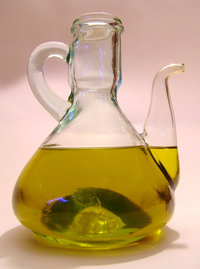» View the recipes involving olive oil
 In agriculture, olive oil is an oil extracted from the fruit of the European olive tree (Olea europaea L.), which originated in the Mediterranean area. It is used in cooking, cosmetics, and soaps. It is also used by Eastern Orthodox Christians as a fuel for their traditional oil lamps. Olive oil is regarded as a healthful dietary oil because of its high content of monounsaturated fat. In agriculture, olive oil is an oil extracted from the fruit of the European olive tree (Olea europaea L.), which originated in the Mediterranean area. It is used in cooking, cosmetics, and soaps. It is also used by Eastern Orthodox Christians as a fuel for their traditional oil lamps. Olive oil is regarded as a healthful dietary oil because of its high content of monounsaturated fat.
Traditionally, olive oil was produced by beating the trees with sticks to knock the olives off and crushing them in stone or wooden mortars or beam presses. Nowadays, olives are ground to tiny bits, obtaining a paste that is mixed with water and processed by a centrifuge, which extracts the oil from the paste, leaving behind pomace. In the United States, producers of olive oil may place the following health claim on product labels: Limited and not conclusive scientific evidence suggests that eating about two tablespoons (23 grams) of olive oil daily may reduce the risk of coronary heart disease due to the monounsaturated fat in olive oil. To achieve this possible benefit, olive oil is to replace a similar amount of saturated fat and not increase the total number of calories you eat in a day. This decision was announced November 1, 2004 by the Food and Drug Administration after application was made to the FDA by producers. Similar labels are permitted for walnuts and omega-3 fatty acids which also contain monounsaturated oil.
Season specials: Easter Recipes, Passover Recipes, Christmas Recipes, Season Recipes, Xmas Recipes
|